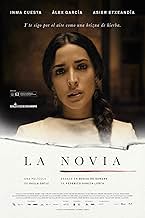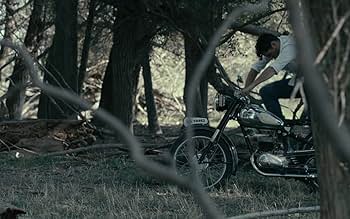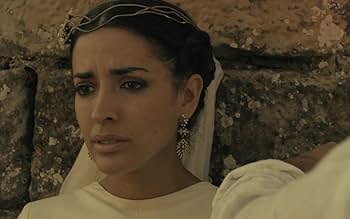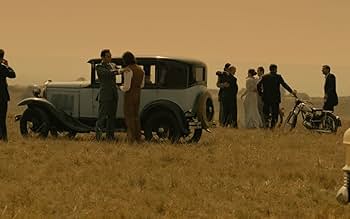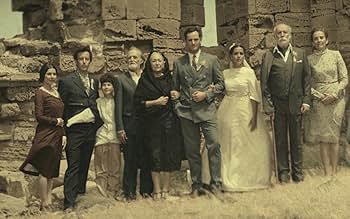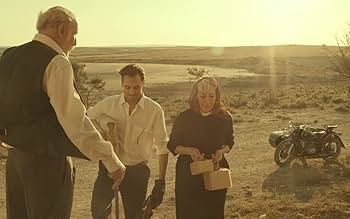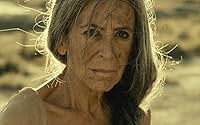CALIFICACIÓN DE IMDb
6.6/10
3.6 k
TU CALIFICACIÓN
Historia trágica de deseos no satisfechos y anhelos prohibidos, elecciones conflictivas y decepción.Historia trágica de deseos no satisfechos y anhelos prohibidos, elecciones conflictivas y decepción.Historia trágica de deseos no satisfechos y anhelos prohibidos, elecciones conflictivas y decepción.
- Dirección
- Guionistas
- Elenco
- Premios
- 19 premios ganados y 34 nominaciones en total
Carmela Labordeta
- Novia Joven
- (as Carmela del Campo)
- Dirección
- Guionistas
- Todo el elenco y el equipo
- Producción, taquilla y más en IMDbPro
Opiniones destacadas
Greetings again from the darkness. The pitch for this movie might have come across as blending a Greek tragedy with a romance novel, and then adding a dash of revenge. Fortunately director Paula Ortiz's vision for the Federico Garcia Lorca play "Bodas de sangre" is more poetic and lyrical than such an overview would suggest.
Love triangles are the core of many stories and movies, but it's the opening sequence here that clues us in that the trouble has already occurred, and though it removes some of the suspense of "what", it certainly sets the stage for an interesting "how" and "why".
Beautiful Inma Cuesta plays Novia (billed only as the titular bride) who is engaged to Asier Etxeandia (billed only as Novio, the groom). The abundance of family stress (on both sides) has little to do with the wedding plans, and more to do with Leonardo (Alex Garcia). Leonardo is more than the local hunk who is always lurking about on horseback; he's also the third wheel who can't let go of his desire for Novia in spite of his young child and pregnant wife. To make things messier, Novia seems to answer his heightened desire for her with her own uncontrollable passion for him.
It's Yin and Yang. Safe and Dangerous. The bride's conflicted choice leads the groom's mother (Goya winner Luisa Gavasa) to be a foreboding presence throughout, and keeps most of the village on edge. Additionally, there is an element of mysticism as Maria Alfonsa Rossa appears periodically as the figure of death – and we are never quite sure of the motivations behind her advice.
Goya winner Miguel Amoedo provides beautiful cinematography that balances between fantasy, harsh realities, and the romance of the moment. There are many intimate close-ups, as well as some stunning desert wide shots of Leonardo riding the horse. The score and soundtrack are terrific, including Soledad Velez with a haunting version of Leonard Cohen's "Take this Waltz".
The concept of destiny vs. choice hovers over most scenes, and the twisted family and childhood histories give the film a Shakespearian feel. Last year, the film received numerous Goya nominations (including Ms. Cuesta, Ms. Ortiz, Mr. Garcia) are resulted in the wins for Ms. Gavasa and Mr. Amoedo. It may not make the best Valentine's Day date movie, but it is an interesting watch from the romance-tragedy-revenge-horseback genre.
Love triangles are the core of many stories and movies, but it's the opening sequence here that clues us in that the trouble has already occurred, and though it removes some of the suspense of "what", it certainly sets the stage for an interesting "how" and "why".
Beautiful Inma Cuesta plays Novia (billed only as the titular bride) who is engaged to Asier Etxeandia (billed only as Novio, the groom). The abundance of family stress (on both sides) has little to do with the wedding plans, and more to do with Leonardo (Alex Garcia). Leonardo is more than the local hunk who is always lurking about on horseback; he's also the third wheel who can't let go of his desire for Novia in spite of his young child and pregnant wife. To make things messier, Novia seems to answer his heightened desire for her with her own uncontrollable passion for him.
It's Yin and Yang. Safe and Dangerous. The bride's conflicted choice leads the groom's mother (Goya winner Luisa Gavasa) to be a foreboding presence throughout, and keeps most of the village on edge. Additionally, there is an element of mysticism as Maria Alfonsa Rossa appears periodically as the figure of death – and we are never quite sure of the motivations behind her advice.
Goya winner Miguel Amoedo provides beautiful cinematography that balances between fantasy, harsh realities, and the romance of the moment. There are many intimate close-ups, as well as some stunning desert wide shots of Leonardo riding the horse. The score and soundtrack are terrific, including Soledad Velez with a haunting version of Leonard Cohen's "Take this Waltz".
The concept of destiny vs. choice hovers over most scenes, and the twisted family and childhood histories give the film a Shakespearian feel. Last year, the film received numerous Goya nominations (including Ms. Cuesta, Ms. Ortiz, Mr. Garcia) are resulted in the wins for Ms. Gavasa and Mr. Amoedo. It may not make the best Valentine's Day date movie, but it is an interesting watch from the romance-tragedy-revenge-horseback genre.
Visually stunning and emotionally charged Spanish drama that delves into the complexities of love and passion.
First and foremost, Inma Cuesta's performance as the eponymous "Novia" (Bride) is captivating. She portrays the character's emotional turmoil and inner conflict with remarkable depth and vulnerability.
The film's cinematography is a standout feature, capturing the rugged and breathtaking landscapes of rural Spain. The visual storytelling adds an extra layer of beauty to the narrative.
La Novia explores themes of forbidden love, loyalty, and the consequences of past decisions. It weaves a tale of passion and tragedy, leaving a lasting impact on the viewer.
The emotional intensity of the film is heightened by a haunting musical score that perfectly complements the story's dramatic beats.
The supporting cast, including Álex García and Asier Etxeandia, deliver solid performances, adding depth to the complex web of relationships.
However, some viewers may find the film's pacing slow, as it takes its time to delve into the intricacies of the characters' emotions and relationships.
In conclusion, La Novia is a visually striking and emotionally charged drama that immerses viewers in a world of passion and heartache. With Inma Cuesta's compelling performance, the stunning cinematography, and the film's exploration of forbidden love, it's a cinematic experience that leaves a lasting impression.
If you appreciate atmospheric and emotionally-driven films with a touch of romance, La Novia is a must-watch. It's a poignant and visually captivating journey into the complexities of human relationships and the power of love.
First and foremost, Inma Cuesta's performance as the eponymous "Novia" (Bride) is captivating. She portrays the character's emotional turmoil and inner conflict with remarkable depth and vulnerability.
The film's cinematography is a standout feature, capturing the rugged and breathtaking landscapes of rural Spain. The visual storytelling adds an extra layer of beauty to the narrative.
La Novia explores themes of forbidden love, loyalty, and the consequences of past decisions. It weaves a tale of passion and tragedy, leaving a lasting impact on the viewer.
The emotional intensity of the film is heightened by a haunting musical score that perfectly complements the story's dramatic beats.
The supporting cast, including Álex García and Asier Etxeandia, deliver solid performances, adding depth to the complex web of relationships.
However, some viewers may find the film's pacing slow, as it takes its time to delve into the intricacies of the characters' emotions and relationships.
In conclusion, La Novia is a visually striking and emotionally charged drama that immerses viewers in a world of passion and heartache. With Inma Cuesta's compelling performance, the stunning cinematography, and the film's exploration of forbidden love, it's a cinematic experience that leaves a lasting impression.
If you appreciate atmospheric and emotionally-driven films with a touch of romance, La Novia is a must-watch. It's a poignant and visually captivating journey into the complexities of human relationships and the power of love.
The film crew has shot a poem rather than a movie. You would either love or hate this piece; there is most probably no middle ground. I am personally in the former camp. The story itself is as familiar as an ancient Greek tragedy: namely, the sinfully intense love and the revengeful fate. The images are so captivating that makes you feel the characters exist out of space-time. This is highlighted when the heroin encounters "herself" more than a few times throughout the film. If you love poetry in images, then you will not easily forget the beautiful scenes and that primordial sadness arising from the unavoidable fate.
Based on the old Spanish play about a wedding tragedy. It all sets in the rural Spain and tells the story of a bride who involved in a love triangle. It takes us back to her childhood day to reveal us her crush on one of two friends, but feudal between the friends families puts her in a tight spot. Especially as growing up knowing she has to choose one of them to marry. Finally the time comes to that, the day is set for the big occasion, but an unexpected twist brings a chaos during the celebration and the old rivalry awakens among the young generation.
It was a little dull narrative, mostly because of the quietness and lack of depth in both the character explorations and the story. I might say it is only a finishing touch work, we can't get any details we want for a better understanding, especially the past events remains slightly mysterious like how it all began. That's fine, because they thought they chopped away the boring stuffs, and yes they did, yet that did not bring any good result either.
Anyway, this film's focus was the three friends who grew up together, so this story is only about what happens around them. Beside them, the old woman who often appears is a puzzle that's need to be explained. But I assumed she's kind of witch who manipulating the peoples mind to go against each other.
Since it revolves on a wedding event, I was desperately looking forward the ceremony to begin. That's the other reason I felt letdown for it to delay. Until then the pace was too slow to keep myself engaged with this, but once the celebration began, it lit up my mood and followed by the conclusion that came with a light speed. So I kind liked the third act in the entire narration and according to me, that's the best part of the film.
"Bitterness is the worst punishment of all."
There's nothing much happens in the story section, we can easily know what's coming up next after the each scene. Because like I said, there's no great developments, everything was about getting ready for the marriage and during the marriage. It is like learning everything about it prior to the watch, yet the final scene, the solution was stronger than I expected. For an end like that I expected tearjerker atmosphere. The emotions showed between the characters, but for the viewers those are ineffective.
Shot in the cool places, I mean it looked like a semi-desert that did not bring the Spanish atmosphere of my knowledge, but blended well with the story. The character executions were fine, even the direction was good, but the writing was a disappointment. This 80 year old story needed a serious update, because the presentation was very stylish, but the tale was so simple. Yes, it looks so simple to follow, but complicated to fully understand it.
Just keep in mind that it is not a romance nor a revenge film, but a slice of equal both. About other things as well like love, life, family, culture, especially the three main characters linked with, such as the bride's choice, the groom's fate and the their friend's deception. This is definitely not an entertaining film, not for people like me, but what I call it is a story to decode. Like in the line of 'Enemy', 'Upstream Color', 'Borgman' et cetera. There're lot more about it than what actually the story tells, but only discussing with others who had watched it will bring the details out. Honestly, I was not very impressed with this, certainly not a bad film to ignore it completely.
6½/10
It was a little dull narrative, mostly because of the quietness and lack of depth in both the character explorations and the story. I might say it is only a finishing touch work, we can't get any details we want for a better understanding, especially the past events remains slightly mysterious like how it all began. That's fine, because they thought they chopped away the boring stuffs, and yes they did, yet that did not bring any good result either.
Anyway, this film's focus was the three friends who grew up together, so this story is only about what happens around them. Beside them, the old woman who often appears is a puzzle that's need to be explained. But I assumed she's kind of witch who manipulating the peoples mind to go against each other.
Since it revolves on a wedding event, I was desperately looking forward the ceremony to begin. That's the other reason I felt letdown for it to delay. Until then the pace was too slow to keep myself engaged with this, but once the celebration began, it lit up my mood and followed by the conclusion that came with a light speed. So I kind liked the third act in the entire narration and according to me, that's the best part of the film.
"Bitterness is the worst punishment of all."
There's nothing much happens in the story section, we can easily know what's coming up next after the each scene. Because like I said, there's no great developments, everything was about getting ready for the marriage and during the marriage. It is like learning everything about it prior to the watch, yet the final scene, the solution was stronger than I expected. For an end like that I expected tearjerker atmosphere. The emotions showed between the characters, but for the viewers those are ineffective.
Shot in the cool places, I mean it looked like a semi-desert that did not bring the Spanish atmosphere of my knowledge, but blended well with the story. The character executions were fine, even the direction was good, but the writing was a disappointment. This 80 year old story needed a serious update, because the presentation was very stylish, but the tale was so simple. Yes, it looks so simple to follow, but complicated to fully understand it.
Just keep in mind that it is not a romance nor a revenge film, but a slice of equal both. About other things as well like love, life, family, culture, especially the three main characters linked with, such as the bride's choice, the groom's fate and the their friend's deception. This is definitely not an entertaining film, not for people like me, but what I call it is a story to decode. Like in the line of 'Enemy', 'Upstream Color', 'Borgman' et cetera. There're lot more about it than what actually the story tells, but only discussing with others who had watched it will bring the details out. Honestly, I was not very impressed with this, certainly not a bad film to ignore it completely.
6½/10
"At the heart of all great art is an essential melancholy", Spanish dramatist Federico Garcia Lorca's own words which also aptly describe La Novia, a new filmic adaptation by Paula Ortiz of his 1932 play, Bodas de Sangre (Blood Wedding), a tragedy which details a bride's indecision when she is torn between her newly-wedded husband, and her lover. I went to see this film at a Spanish cinema in Cadiz this week with friends, and I was not at all disappointed. Although I have never studied this particular play, I am quite familiar with Lorca's other work, having analysed his Romancero Gitano (Gypsy Poetry) at University and his equally influential play, La Casa de Bernarda Alba (The House of Bernarda Alba), at Grammar School. Throughout his work, Lorca's sympathy is always with the lower classes, from which come his protagonists. Lorca's own story is an interesting and melancholic one, coming from a wealthy farming background in Andalucia, and growing to dislike his status of wealth, and identifying instead with the lowly.
Not only was Lorca troubled by his own social identity, he was also homosexual, which, you will see, adds another dimension to his written work and which, along with his status as a political dissident in the Spanish Civil War, led to his brutal assassination at the hands of the Civil Guard. I digress... La Novia is a beautiful film which makes wonderful use of long shots to capture the warm, bare, aridity of Spanish countryside, almost a metaphor for death and devastation which the transgression brings in the story. It was, I imagine, almost a given that this film would win this year's Goya Award for Cinematography, with thanks to Miguel Amoedo. For the average film-goer, the plentiful, expressive shots may lag, and may be seen as "art for art's sake". All the same, one cannot deny the awe they inspire. In terms of the acting, Inma Cuesta is wonderful in the part of the bride, and often looks strikingly like a young Penelope Cruz. Equally great are the bride's love interests; Asier Etxeandia, who plays the husband; and Alex Garcia, who plays Leonardo, the lover. Spanish film aficionados will also be able to recall Luisa Gavasa, a stalwart of Spanish cinema, who stuns with her performance as the husband's mother - a character beset with horrific premonitions of a disastrous marriage. The music, by Shigeru Umebayashi, is also stirring.
Lorca also said in his lifetime that "In Spain, the dead are more alive than the dead of any other country in the world." This new (filmic) lease of "life" for Lorca is clear proof of this statement. As I have already seen, Spain is a country which refuses to forget its past, literary, filmic, or otherwise.
Not only was Lorca troubled by his own social identity, he was also homosexual, which, you will see, adds another dimension to his written work and which, along with his status as a political dissident in the Spanish Civil War, led to his brutal assassination at the hands of the Civil Guard. I digress... La Novia is a beautiful film which makes wonderful use of long shots to capture the warm, bare, aridity of Spanish countryside, almost a metaphor for death and devastation which the transgression brings in the story. It was, I imagine, almost a given that this film would win this year's Goya Award for Cinematography, with thanks to Miguel Amoedo. For the average film-goer, the plentiful, expressive shots may lag, and may be seen as "art for art's sake". All the same, one cannot deny the awe they inspire. In terms of the acting, Inma Cuesta is wonderful in the part of the bride, and often looks strikingly like a young Penelope Cruz. Equally great are the bride's love interests; Asier Etxeandia, who plays the husband; and Alex Garcia, who plays Leonardo, the lover. Spanish film aficionados will also be able to recall Luisa Gavasa, a stalwart of Spanish cinema, who stuns with her performance as the husband's mother - a character beset with horrific premonitions of a disastrous marriage. The music, by Shigeru Umebayashi, is also stirring.
Lorca also said in his lifetime that "In Spain, the dead are more alive than the dead of any other country in the world." This new (filmic) lease of "life" for Lorca is clear proof of this statement. As I have already seen, Spain is a country which refuses to forget its past, literary, filmic, or otherwise.
¿Sabías que…?
- TriviaDirector Paula Ortiz cares immensely about the artistry of the shots and takes, that's why the cast usually had to act through adverse or unpleasant environment conditions. For example, the scene when the bride sings "la Tarara" was filmed in the middle of the desert of Los Monegros at 5 a.m. Actors also had to deal with strong wind (cierzo), blinding light or mosquitoes, or even against the clock filming when the scenes happened at sunset.
- ErroresThe groom chases the unfaithful bride on a BMW R25/2, formerly seen in the film with a sidecar. When he arrives, he rides an unidentified motorcycle (could it be a BSA?) which stalls.
Selecciones populares
Inicia sesión para calificar y agrega a la lista de videos para obtener recomendaciones personalizadas
- How long is The Bride?Con tecnología de Alexa
Detalles
- Fecha de lanzamiento
- Países de origen
- Sitio oficial
- Idioma
- También se conoce como
- The Bride
- Locaciones de filmación
- Productoras
- Ver más créditos de la compañía en IMDbPro
Taquilla
- Presupuesto
- EUR 1,187,147 (estimado)
- Total a nivel mundial
- USD 1,779,966
- Tiempo de ejecución
- 1h 36min(96 min)
- Color
Contribuir a esta página
Sugiere una edición o agrega el contenido que falta

![Ver Tráiler [OV]](https://m.media-amazon.com/images/M/MV5BMzg3YWM0YjAtNDg2ZC00ZGE0LWJhYzMtNzg3NjBmYTcxY2FhXkEyXkFqcGdeQXRyYW5zY29kZS13b3JrZmxvdw@@._V1_QL75_UX500_CR0)
![Teaser Tráiler [OV]](https://m.media-amazon.com/images/M/MV5BNTVjMzNlNGEtMDNhNi00MGY1LTgxNzUtZDc3YjA2NGUyODE0XkEyXkFqcGdeQXRyYW5zY29kZS13b3JrZmxvdw@@._V1_QL75_UX500_CR0)
